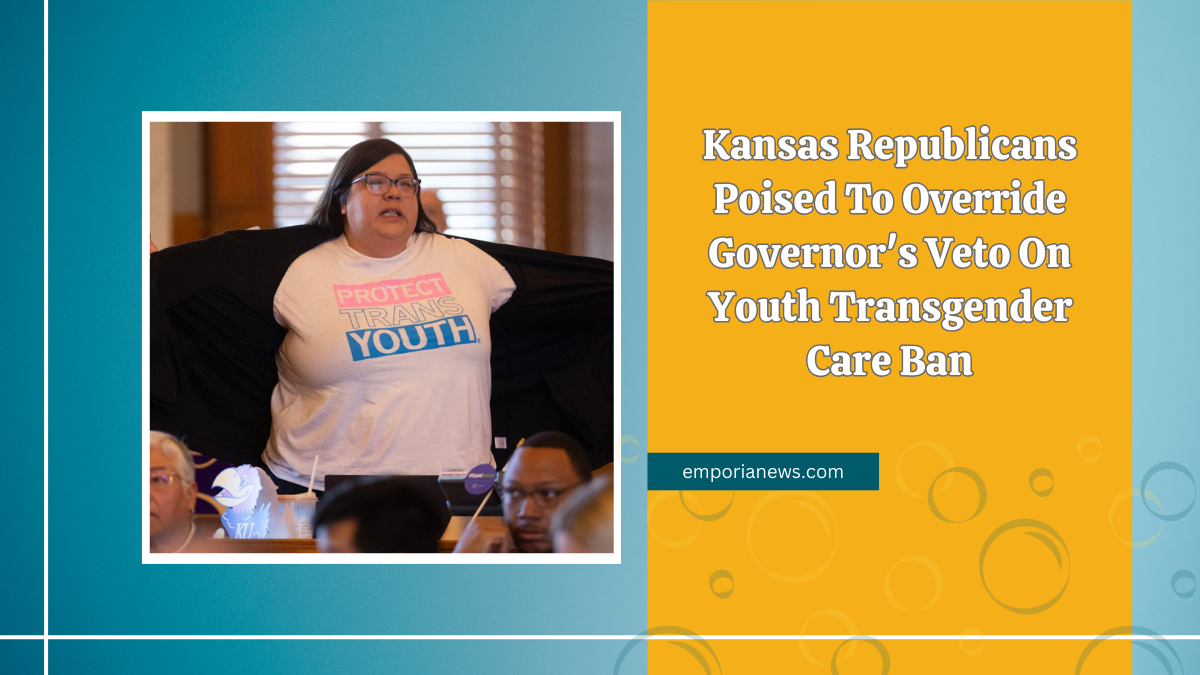In February 2025, Kansas Republican legislators are preparing to override Governor Laura Kelly’s recent veto of a bill that seeks to prohibit gender-affirming medical care for transgender minors.
This legislative move underscores the ongoing national debate over transgender rights and youth healthcare.
Legislative Background
The contested bill aims to ban medical interventions for transgender individuals under 18, including:
- Surgical Procedures: Prohibiting surgeries intended to align an individual’s physical appearance with their gender identity.
- Hormonal Treatments: Restricting access to hormone therapies that support gender transition.
- Puberty Blockers: Banning medications that delay the onset of puberty in transgender youth.
Governor Kelly vetoed the bill on February 11, 2025, emphasizing the importance of focusing on pressing issues like rising living costs. She stated, “Infringing on parental rights is not appropriate, nor is it a Kansas value.”
Republican Response and Override Strategy
Republican leaders, holding a supermajority in both legislative chambers, are confident in their ability to override the veto. Senate President Ty Masterson indicated that a vote could occur early in the week of February 17, 2025.
House Speaker Dan Hawkins echoed this sentiment, suggesting that the House would act swiftly following the Senate’s decision.
Democratic Concerns and Legal Implications
Democratic legislators express concern over the potential override. Senate Minority Leader Dinah Sykes remarked, “I’m not very optimistic that we will be able to sustain that veto.”
House Minority Leader Brandon Woodard highlighted the possibility of judicial intervention, noting the role of the judiciary in assessing the bill’s constitutionality.
National Context and Legal Challenges
Kansas is among several states pursuing restrictions on gender-affirming care for minors. As of early 2025:
- 26 States: Have implemented some form of ban on youth gender-affirming care.
- Legal Challenges: States like Arkansas and Montana have seen their bans blocked by court orders, with ongoing litigation in 13 states.
These legal disputes often center on constitutional rights and medical ethics, with courts evaluating the balance between state regulations and individual freedoms.
Potential Impact and Future Outlook
If the Kansas Legislature successfully overrides the veto, the ban on gender-affirming care for minors would become law.
This action could prompt legal challenges, potentially leading to prolonged court battles. The outcome in Kansas may influence legislative and judicial actions in other states grappling with similar issues.
| Aspect | Details |
|---|---|
| Bill Provisions | – Bans surgical procedures, hormone therapies, and puberty blockers for minors. – Prohibits state employees from promoting social transitioning for children. |
| Governor’s Position | Vetoed the bill, citing concerns over parental rights and prioritizing pressing issues like economic challenges. |
| Republican Strategy | Confident in overriding the veto due to supermajority; Senate vote expected early in the week of February 17, 2025, followed by prompt House action. |
| Democratic Concerns | Doubtful about sustaining the veto; anticipate potential judicial review regarding the bill’s constitutionality. |
| National Context | – 26 states have enacted similar bans. – Legal challenges have blocked such bans in states like Arkansas and Montana; 13 states face ongoing litigation. |
| Potential Outcomes | Successful override could lead to legal challenges, influencing future legislation and court decisions on transgender youth healthcare rights. |
FAQs
What does the Kansas bill propose regarding transgender youth?
The bill seeks to ban gender-affirming surgeries, hormone treatments, and puberty blockers for individuals under 18. It also aims to prevent state employees from promoting social transitioning for minors.
Why did Governor Laura Kelly veto the bill?
Governor Kelly expressed concerns about infringing on parental rights and emphasized the need to focus on pressing issues like rising living costs.
What is the likelihood of the veto being overridden?
Given the Republican supermajority in both legislative chambers, there is a strong possibility that the veto will be overridden.




